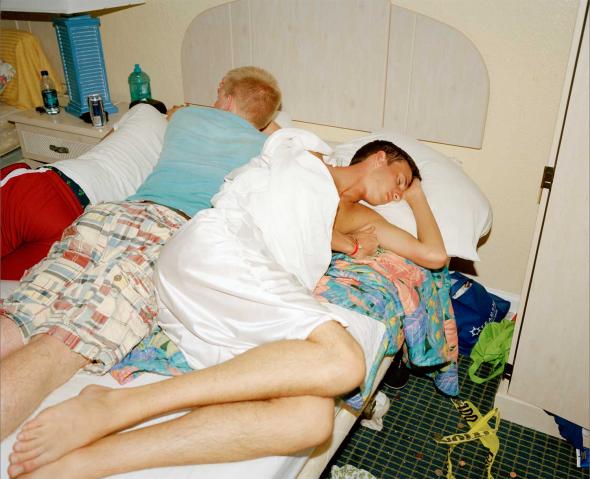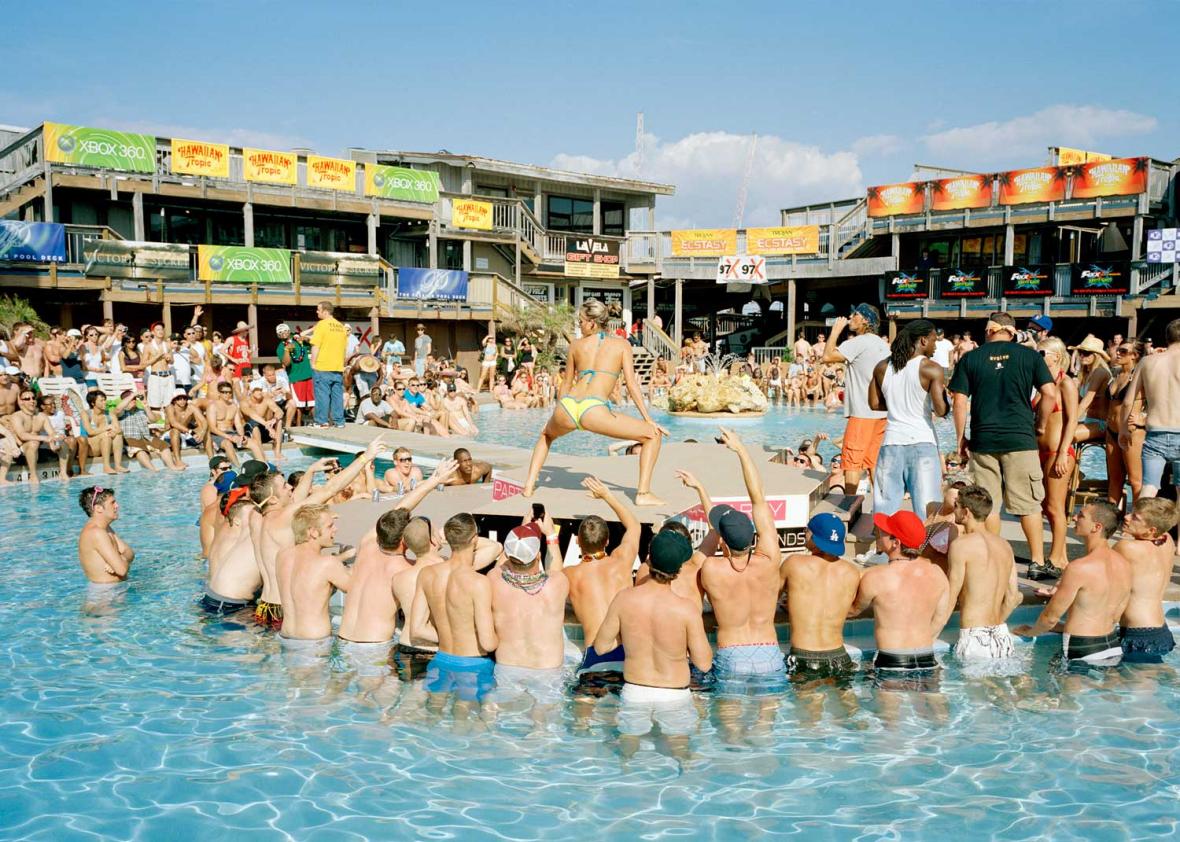Spring Break’s Cleanup Crew
It’s the worst time to be a hotel housekeeper in Miami. The rest of the year’s pretty bad, too.

Photo from “Beach Party” by Emiliano Granado
This article was reported in partnership with the Investigative Fund at the Nation Institute.
At the four-star Fontainebleau Miami Beach, the iconic, ocean-facing hotel immortalized in movies such as Goldfinger and Scarface, the service can feel as opulent as the vintage decor. While guests shop or lounge poolside, a small army of housekeepers works its way up and down the angular white and turquoise towers, cleaning about a dozen rooms each over the course of a day.
Among them is Adelle Sile, a Haitian-born housekeeper with cherry-hued corkscrew curls, a compact frame, and deep-set eyes. Around this time of year, thanks to the influx of spring break and Easter break vacationers, the time she has to clean each room during her eight-hour shift gets squeezed as guests stretch their mornings to the final minutes before checkout. When she does finally get in, she sometimes opens the door to find vomit, empty bottles, crack pipes, marijuana buds, and makeshift mattresses of cushions and blankets strewn about—the season’s bacchanalian detritus.
“My back [is] hurting me. Picking up trash, picking up trash, trash everywhere, like this, like this,” Sile said recently, demonstrating the scene in her modest, pleather-upholstered living room in her working-class immigrant neighborhood in North Miami. By the end of the day, she said in a Creole-inflected drawl, “My body dead.” (The Fontainebleau declined to comment for this article.)
Compared with even lower-paid work in retail and fast food, hotel jobs are considered a decent way to earn a living in Miami, offering one way for poor immigrants to work toward living wages and benefits after a few years. Though tourism service jobs start at poverty pay scales, the fast-growing sector offers a narrow path out of drudgery. But the annual pilgrimage of college students for spring break coincides with a sharp rise in both complaints and grievances—complaints from guests about poor service and grievances filed by workers in disputes with managers over working conditions or contract rules.
“Spring break is all about partying, getting drunk, acting wild. … And the housekeepers, they’re the ones that have to do the cleaning up after,” said Kandiz Lamb, an organizer with the hospitality workers union Unite Here, which represents workers at a handful of area hotels and casinos. “It’s all kind of stuff that happens. People getting so drunk [they’re] like almost drowning in pools, falling asleep in hallways, aggressive, getting into fights in the hallways.”
As a top spring break destination, Miami banks on the period from mid-February to March. Last March, domestic tourism reached a seasonal high of 791,000 travelers—up from about 749,000 in 2014—feeding a record 15 million overnight visitors from 2014 to 2015 and roughly $25 billion in revenue. Room rates topped more than $250 per night.
As young tourists flood into South Beach, however, so do problems. Surveys and data have associated the annual rite throughout the region with increases in alcohol-related injury and sexual assault, and in top spring-breaker destinations, an uptick in vehicle fatalities.
The city’s leisure and hospitality workforce, composed of tourist-oriented service occupations from food service to janitorial work, rose to some 135,000 workers last March, up 5,000 compared with the previous spring, according to employer surveys. Overall, employment in accommodations has grown by about 30 percent since 2008. Much of the workforce is irregularly employed, often working for tips or on volatile part-time schedules, some without papers or off the books. And as megahospitality conglomerates absorb masses of poor workers and hungry consumers, advocates say contingent, subcontracted, and “precarious” or unstable jobs are proliferating in the leisure trades.
The housekeeping workforce is at the front line of the tourism surge, literally cleaning up after the two-week party storms through South Beach. Housekeepers, also called room attendants, are at the upper end of the low-wage sectors, generally earning between $9 and $10 an hour, but often on long or erratically scheduled shifts, and with few workplace benefits such as health insurance. This largely female workforce undergirds an industry of lavish excess with viciously efficient profit margins and relentless pressure to labor longer and harder, pressure that plows ever deeper into overstretched bodies.
* * *

Photo from “Beach Party” by Emiliano Granado
R. hasn’t taken a vacation in two years—the hospitality industry doesn’t pay enough for her to afford a break from her job serving vacationers at a high-end South Beach art deco hotel. (Her identity, along with others in this piece, has been withheld as a precaution against possible retaliation by employers.) At the lavish destination, which was recently taken over by a conglomerate that operates lodgings and resorts under top brands, her hourly wages have remained stuck at $10.50 for about two years, she said through a translator. Yet the day-to-day work for the housekeeping staff has dramatically intensified. “They don’t listen to the employee. ... We’re simply ‘the ones that clean,’ ” she said. “[But] we are the ones who carry the hotel.” (Her employer refused to comment for this article.)
And the mess rains down when spring break season hits. “People have shit themselves, they’ve bled a lot. We’ve had to throw away everything from an entire room—pillows, everything—because they’ve shit everywhere,” R. said in a recent interview after work.
Increasingly competitive high-end resorts strive to keep their labor costs as lean as possible, typically by intensifying workloads for staffers like R. or by outsourcing some jobs to automated technology or third-party contractors. Maintenance and food services can be readily contracted out to a growing sector of temporary staffing agencies, providing “on-demand” workers for back-of-the-house positions.
With the consolidation of multinational hotel chains, companies have sought “efficiencies” on the backs of housekeeping staff, supplementing the regular workforce by hiring staffing agency workers as temps, generally without the wages, benefits, or job security that a regular full-time staffer would have. R. said that at her hotel, the baseline workload is about 16 rooms a day, regardless of how messy the guests are, even during heavy seasons such as spring break. And workers face continual pressure to clean more but not to stay late, lest the hotel have to pay overtime, so their work essentially gets cheaper by the hour. “I want to work,” she said. “What I don’t want is to be a slave.”
Amid the chaotic partying, hotel workers face other troubles. Sile and her co-workers are always vigilant: There are extra steps to take when cleaning during spring break and other party weeks, such as checking for used condoms tossed behind the furniture. They say some guests are quick to complain about missed dirty spots, using it as a reason to demand a complimentary night; workers suspect some guests of planting a mess in order to blame the housekeeper afterward and wheedle a concession out of the management. Either way, they said, it’s the housekeeper, not the guest, who ends up taking the heat from management.
Drawing from personal experience and stories from co-workers, Sile recalled, some guests make inappropriate requests, such as asking for an oil rub, or call for special service and then corner a housekeeper and try touch her. Housekeepers are supposed to report such incidents and call for intervention, union advocates say, but fear of losing their jobs compels some to stay silent.
“More men is more worse for us,” Sile said, noting that room attendants often find themselves moving between rooms alone. “Memorial Day and spring break and July 4. Those days, we really do feel uncomfortable to clean the room, when we are going there inside the room. You [are] always checking behind you.”
In a 2015 Cosmopolitan survey, more than 4 in 10 women in the food service and hospitality sectors reported experiencing sexual harassment. There are no comprehensive statistics on the prevalence of harassment in these workforces, but according to a 2008 research review, various studies from the past decade based on small samples showed that workers encountered harassment or aggression by customers on the job at rates of up to 80 percent.
A few years ago during spring break, a housekeeper at a prestigious Miami hotel got badly beaten—allegedly by a guest who had tried to sexually assault her, Lamb said. The union helped her get a settlement with the hotel, but at most other hotels, the worker might have had no recourse. “They have nobody to back them up or say anything,” Lamb said. “They’re out on their own.”
At typical nonunion hotels, where workers are “at will” and have no protection against arbitrary firing, housekeepers are used to going it alone, and the only limit on how much they work is how much their bodies can take over the course of a day. As nonunion workers, they may be more easily shifted onto per-room pay, increasing the pressure to clean ever faster. N., from Honduras, spoke to Slate outside the large, established Orlando hotel where she said she works. Speaking with a reporter and a translator, she said that an agency contracts her to supplement the permanent hotel staff, cleaning more than twice as many rooms as housekeepers at the Fontainebleau in a typical day. She works by volume, earning $3.30 per room cleaned, rather than by the hour—reflecting an industrywide management inclination to ramp up volume using per-room pay scales. After several years as a “permatemp” at the hotel, she’s gotten fast enough to pull in as much as $1,200 every two weeks working seven days a week. “If you are new in this work and you’re slow, the most you’ll make will be $300, $350 per week,” she said. (A full-time week at Florida’s hourly minimum is about $320.) But spring breakers effectively cost workers more; the trashed rooms they leave behind (perhaps after sleeping in past checkout) could take up to an hour. The harder they party, the further N. risks slipping below minimum wage.
Housekeepers’ bodies tend to retire before they do. According to surveys, housekeepers face some of the highest injury risks in the hotel workforce. The hazards range from chemical exposures and infection risk from blood and vomit to repetitive stress injuries to the occasional violent outburst from a rowdy guest.
Workplace safety advocates point to a rising risk of trauma from a dangerous intensification of housekeeping duties. Intensified workloads, such as workers regularly being tasked with making more than 18 beds per day, is linked to higher rates of job-related musculoskeletal disorders, such as back, joint, or nerve pain. Housekeepers’ typical shifts at top chain hotels might involve lifting mattresses that weigh more than them and stripping up to hundreds of pounds of bed linens over the course of a shift. A 2006 study by Unite Here on scores of union hotels found that room cleaners suffer a 70 percent higher injury risk than other hotel workers, and women and Latinos are particularly vulnerable. But in another survey, most hotel room cleaners said they never reported work-related pain to supervisors.
“Housekeeping duties [are] the most difficult job in the entire hotel. ... The price [of the work] is the health of the workers,” said Carmen Sera, a Cuban-born veteran housekeeper at the Fontainebleau who serves as a union steward and spoke through a translator. Sera said she herself has had about seven hernias in her back.
* * *

Photo from “Beach Party” by Emiliano Granado
Hotels seeking temp workers are now tapping into an even more efficient pipeline of cheap labor, sourced from abroad every year in the massive recruitment of so-called guest workers. These migrants come on short-term labor visas to fill supposed shortages of workers in various industries. During peak business seasons, thousands of laborers, mostly from Latin America, come to work in tourism- and hospitality-related service jobs under H-2B visas—the visa that Donald Trump’s Mar-a-Lago Club has used to import scores of foreign workers at the historic estate in Palm Beach, Florida. In 2014, about 34,800 visas were issued for groundskeeping and landscaping workers, along with about 6,000 maids and housekeepers and 5,900 amusement park attendants.
Though the H-2B visa—for which Florida and Texas are top destinations—is designed to supplement industrial-sector firms that cannot find enough “qualified” U.S. workers, critics say the rules are so lax the system has become a back door for unregulated, but nominally legal, migrant labor. Hotels can also arrange to temporarily hire college students through a “cultural” or “educational” visa known as the J-1, overseen by the State Department.
In recent years, many H-2B workers have complained of wage abuses and recruitment fraud, and J-1 students have filed legal complaints for, for example, signing up for managerial posts and then serving as janitors for a summer. For foreign workers, their key asset is their captivity; they essentially cannot, under guest-worker visa rules, switch employers. As a result, these workers often get stuck in jobs that either were not what they applied for or don’t offer them the promised hours.
Jesse from the Philippines hoped to get professional experience in Florida’s hospitality sector a few years ago through the H-2B program, but the agency that sponsored her ended up leaving her stranded. She got a string of referrals but never actually worked for more than a few weeks at a time, she said, paying the labor broker roughly $1,000 in fees just to be on constant standby, virtually bonded to the agency for more than a year. The scheme was eventually busted by the Justice Department, after the agency was found to have bilked about $52 million collected from workers from the Philippines, Brazil, Russia, and Dominican Republic. “I felt like just being disposable people,” she recalled. “When they need us we’re there; when they don’t need us we’re not there.”
According to Greg Schell, a labor attorney with Florida Legal Services, even if they aren’t paid much less than U.S. workers, H-2B workers are preferred in the hotel industry because they offer flexibility and reliability. From the management’s perspective, U.S.-based workers provide a less stable return on investment: “[They] take off, they switch jobs, they have to go take a kid to the doctor. The foreign worker doesn’t have his family here. He’s here to work whenever I need it.”
* * *

Photo from “Beach Party” by Emiliano Granado
Whether they’re imported from abroad, migrated on their own seeking work, or are native-born locals, Florida’s hospitality workers reside on the margins of the law. As part of a wider crackdown on labor abuses in hospitality, the federal Department of Labor has recently investigated several Florida hotel employers for exploiting migrant and subcontracted workers—forcing the hotels to pay back wages—and ramped up regulations of third-party staffing firms. But investigations are generally triggered by individual complaints—not something your average immigrant temp worker is likely to do if she is shorted on wages or harassed on the job.
One of the few institutions in Florida that actively protects hotel workers is Unite Here. But currently it represents only four fully operating Miami hotels—St. Regis, the Fontainebleau, the Diplomat, and Miami Beach Resort—a total of roughly 2,400 workers, along with various airport concessions and local casinos. With about 6,500 members across Miami-Dade and Broward counties, the union struggles to engage workers. Many are fearful of losing their jobs if they try to organize. And, according to workers and labor advocates, workplace solidarity is hampered by racial divides: Latinos, native-born blacks, and Haitians often find themselves sorted in a hierarchy that puts lighter-skinned workers in better-paid jobs.
A union contract has given Sile a layer of protection. When working for another local union hotel about 10 years back, she recalled, she was called back during the busy Easter holiday to do extra cleaning. A member of the supervisory staff threatened to report her for refusing, but Sile knew her contract. “I tell her, you know what? Your boss is not my mother. … Report it. I don’t mind.”
But not everyone can decide when he or she has had enough work for the day. S., a former co-worker of R.’s, tried to fight back when new management started speeding up her work regime. She was dismayed that she was being forced to do a rush job and seeing her tips drop off accordingly as guests returned to find half-cleaned rooms.
Though the management constantly monitored workers to keep them on pace, S. and the other workers had to race the clock against globs of caked beach sand and fungus plastered to the tub: “All the sheets are full of makeup and suntan lotion. You can barely even walk. ... I would clean up that whole mess, and the next day it would be exactly the same.”
Under the old management, S. recalled through a translator, she could take her time to make the sleek vintage decor in each room sparkle. But with the new daily quota, she worked to exhaustion and then felt ashamed for doing a rush job. While she used to take pride in her presentation as a hotel staffer, “well-dressed and proper, able to greet the guests when they came back to the room,” now her job left her sweaty and reeking of cleaning fluid. “I would just kind of scuttle away because I didn’t want to even be there.”
S. literally struggled to stand upright. To get out of a chair, she said, “Little by little, I’d straighten myself, because of how much I had to bend over to pick up the mattresses and the vacuum cleaners.”
As her aches and stress mounted, S. started complaining at staff meetings about how the new cleaning regime was straining workers and hampering them from doing a thorough job. Once she even helped orchestrate a brief work stoppage—the housekeepers decided one day to simultaneously drop their rooms and punch out in protest. But that advocacy only incurred more hostility from her bosses. On what turned out to be her last day, she was in tears, too tired to complete her assigned 10 checkouts (which must be completely cleaned and set up again for a new guest). She felt that gave her supervisors a convenient pretext for finally dismissing a troublemaker. She was told to take a few days off and then not to come back.
“It really tore me up inside,” she recalled. “I was crying that day ... because I was leaving behind most of my co-workers in that kind of place.” She had contacted Unite Here, hoping the union could “come and do an investigation and then help the workers.” But since the hotel was nonunion, there was little the union could do to intervene.
Her dismissal came just when she was ready to leave hotel work behind. “You just work, work, work,” she said, “and people don’t see the effort that you’re putting in. ... I would rather do anything other than [return to] that.”
Now when friends ask S. about getting a housekeeping job, she warns that her former hotel is “a terrible place” to work. But Millionaires’ Row, the fulcrum of Miami’s leisure industry, still exerts a powerful pull. For the hotel boss, she said, as long as the tourists keep streaming in, workers keep churning through, and veteran housekeepers like her are always replaceable. “If one of them leaves, there’s five more at the door waiting to try and get a job here.”
The Grind is a yearlong series looking at the unsavory—and often hidden—working conditions behind some of our cherished annual traditions. It is a collaboration with the Investigative Fund at the Nation Institute, a nonprofit journalism center.
